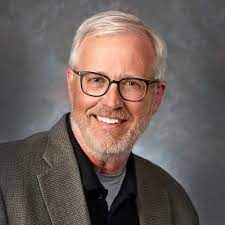by Tom Boogaart
The street that links my house and Western Seminary is called College. For thirty years now I have walked it up and down. I know each crack in the sidewalk. I’ve watched cement being poured for driveways, silvery and new, and I have watched it darken as the pigment of fallen leaves bleeds into it. I mark the trees and remember those that have been cut down; I notice when and where flowers are planted and how they are often signs of hope in otherwise barren yards. I observe the houses in various stages of repair. I become acquainted with the dogs, and I have learned that the spirit of the dog often manifests the spirit of the house.
College Street has become part of my life, a part of my spiritual geography. I have learned things about myself and my world as I pass through it. People whose names I do not even know have shared their lives with me and taught me truths about God’s way with the world.
I remember a particular morning. As was my pattern, I cut behind the Admiral Gas station and was heading north toward the seminary. Moving against the grain of children making their way to Longfellow School, I heard the voice of a mother yelling from inside a house across the street: “Hurry up! Hurry up!”
A boy and a girl, maybe nine and ten, banged open the aluminum door of the front porch and walked down the steps toward the car in the driveway. As they got into the car, their mother appeared in the doorway. She turned back toward the inside of the house and yelled: “I said, hurry up. If you’re not ready we’re gonna leave ya behind!”
As the mother made her way to the car, a third child, a boy perhaps five years old, tumbled down the front steps holding his back pack while trying to put on his coat.
“Hurry up! Hurry up!” the mother kept yelling. The more she yelled the more the boy struggled. “Momma, momma, wait for me,” the boy pleaded.
“That’s it,” the mother said, “We’re leaving.” She got into the car, revved the engine, and backed into the street. The boy sat up on his knees bewildered. As they drove down the street, he stood up and ran after them, crying out: “Momma, Momma! Come back! Come back!”
A block down the road the car stopped, and the boy got in.
The human drama unfolding before me was unsettling and painful to watch. I realized that one of the deepest fears known to human beings had been realized in that young boy’s life, the fear of abandonment. Life would never be the same for him. At some level of his being, he would forever carry the fear that home was not what it appeared to be. He knew now that those he loved and those upon whom he depended were capable of driving away and leaving him behind.
His mother would surely try to make it up to him, an ice cream cone, or a special birthday cake. In a reflective moment she would realize what she had done and would say that she was sorry. Yet, whatever assurances of love he would receive now or in the course of his life, they would have to be measured against this knowledge of abandonment. Such assurances just might not be enough to change his fear to faith again.
We all share the boy’s experience, often in less dramatic form. No parent ever loves us the way we need to be loved. No parent ever could. Parents bear their own hurts and pass them on, often unknowingly, to their own children. Small episodes of abandonment add up over the years, and the weight presses down on us—I’m too tired; here is some money, take one of your friends to the movie. Can’t you do better than that? If you do that one more time, I’m gonna let you have it. Mommy, Daddy, watch me, watch me. We find ourselves caught between longing for the home we never had and lashing out at the one we did have. We ache in our hearts to be loved, to be known, to be carefree in the presence of others. We ache for the place where perfect love casts out fear.
It is with such longing that the people of Israel gathered themselves and made their yearly pilgrimages to the house of God in Jerusalem. As they traveled, they sang songs like this one, anticipating their homecoming and the feast that God, the Homemaker, had prepared for them:
You prepare a table before me
where my enemies greet me;
you anoint my head with oil;
my cup overflows.
Surely goodness and mercy shall follow me
all the days of my life,
and I shall dwell in the house of the Lord
my whole life long. Psalm 23: 5-6
Tom Boogaart teaches Old Testament at Western Theological Seminary in Holland, Michigan.

